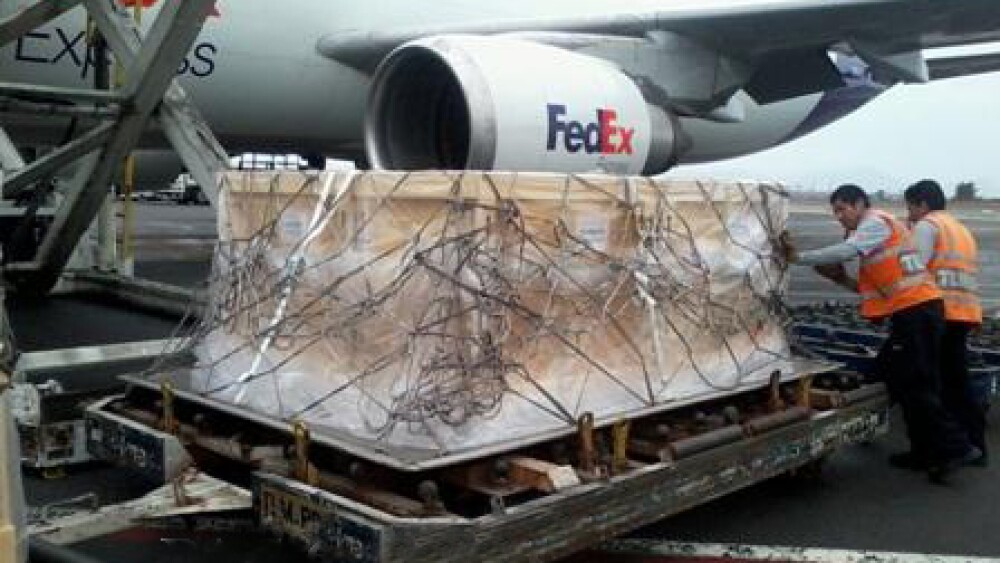MIAMI, January 7, 2013 — With a proven reputation for safely delivering pieces of history, FedEx Express, a subsidiary of FedEx Corp. (NYSE: FDX), again rose to the challenge with the successful transport of 127 crates of historic Machu Picchu artifacts. The precious cargo moved on a dedicated FedEx Express aircraft from Newark, N.J., to Lima, Peru. Once in Lima, the artifacts were transferred to a military base, and then flown by the Peruvian government to a new museum home in Cusco, Peru.
The crates contained delicate stone tools and fragile ceramic fragments, which had been conserved for nearly a century at the Yale Peabody Museum of Natural History. To achieve the result envisioned by its agreement with the government of Peru, and a new partnership forged with the University San Antonio Abad of Cusco (UNSAAC) in Cusco, Peru, Yale University turned to FedEx for assistance in safely moving the irreplaceable items. FedEx — which has helped museums, governments and private individuals move delicate cargo in the past — donated project funds and the use of an Airbus A300 aircraft to make the critical delivery possible.
“We’re grateful to FedEx for its logistical expertise needed to make this historic move,” said Derek Briggs, director of Yale’s Peabody Museum of Natural History. “We are looking forward to working with our UNSAAC colleagues in an ongoing partnership to display and study the collection of Machu Picchu archaeological material excavated by Hiram Bingham in 1912.”
Upon Yale’s delivery of the artifacts to Newark Liberty International Airport, FedEx Express took control of the crates, developing a customized load plan for the flight to ensure their safety, and monitoring the priceless shipment from take-off to landing nine hours later. A charter manager also made the journey alongside the regular flight crew to assist the loadmaster with loading and unloading the crates, and to work with airport authority and customs agents on the ground at Jorge Chavez International Airport in Lima, Peru.
The mission required FedEx Express team members to communicate with customs agents in Lima ahead of time to help clear the flight and its contents — offering a truly customized solution for easier delivery.
“We specialize in using our extensive network to help our customers chart their own course,” said Dave Lange, managing director, FedEx Express Charters. “Each critical shipment has its own unique requirements in terms of handling and customs clearance.”
Once in Lima, the Peruvian government escorted the shipment of artifacts to its new home at the UNSAAC-Yale International Center for the Study of Machu Picchu and Inca Culture. The museum opened in October 2011, and is just a short train ride from the ancient Machu Picchu site.
“FedEx has a long history of transporting delicate cargo, and it is a privilege to serve as the trusted carrier of these priceless pieces of history,” said Juan N. Cento, regional president FedEx Express Latin American and Caribbean division. “FedEx is proud to have been involved in an opportunity that has not only shaped history, but also linked cultures.”
Delivering History
The movement of the priceless Machu Picchu artifacts is the latest success story for FedEx, whose own history includes “delivering history.”
- As part of a worldwide tour, FedEx Express transported the “Fenix” rescue capsules used in the historic rescue of 33 Chilean miners trapped underground for nearly ten weeks in 2010.
- FedEx Express also transported 90 tons of material for “Titanic: The Artifact Exhibition,” including a 3,000-pound piece from the ship’s hull, from Milan, Italy to Atlanta, Georgia.
- FedEx Express delivered artifacts and the complete sterling silver service created for the USS Indiana to the USS Indianapolis Museum at the Indiana World War Memorial in Indianapolis after 76 years at sea, as well as the 3,000-pound Liberty Bell for the Veterans of Foreign Wars Foundation.
